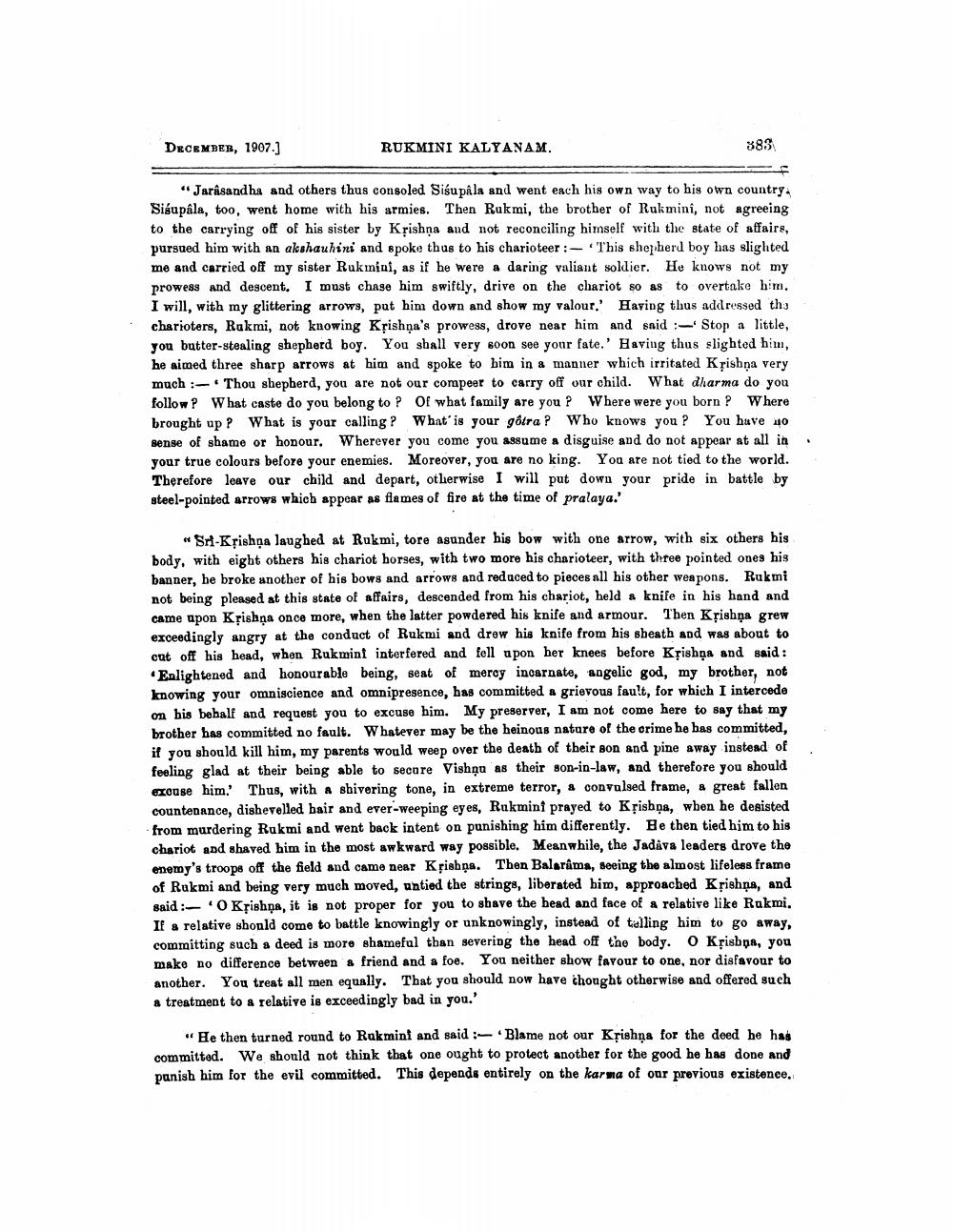________________
DECEMBER, 1907.)
RUKMINI KALYANAM.
383
"Jarasandha and others thus consoled Sisupala and went each his own way to his own country Sisupala, too, went home with his armies. Then Rukmi, the brother of Rukminî, not agreeing to the carrying off of his sister by Krishna and not reconciling himself with the state of affairs, pursued him with an akshauhini and spoke thus to his charioteer :- This shepherd boy has slighted me and carried off my sister Rukmini, as if he were a daring valiant soldier. He knows not my prowess and descent. I must chase him swiftly, drive on the chariot so as to overtake him. I will, with my glittering arrows, put him down and show my valour. Having thus addressed th3 charioters, Rukmi, not knowing Kșishna's prowess, drove near him and said : - Stop a little, you butter-stealing shepherd boy. You shall very soon see your fate.' Having thus slighted him, he aimed three sharp arrows at him and spoke to him in a manner which irritated Kțishņa very much :- Thou shepherd, you are not our compeer to carry off our child. What dharma do you follow? What caste do you belong to ? Of what family are you? Where were you born? Where brought up ? What is your calling? What'is your gôira? Who knows you? You have 40 sense of shame or honour. Wherever you come you assume a disguise and do not appear at all in your true colours before your enemies. Moreover, you are no king. You are not tied to the world. Therefore leave our child and depart, otherwise I will put down your pride in battle by steel-pointed arrows which appear as flames of fire at the time of pralaya.
Srt-Krishna laughed at Rukmi, tore agunder his bow with one arrow, with six others his body, with eight others his chariot horses, with two more his charioteer, with three pointed ones his banner, he broke another of his bows and arrows and reduced to pieces all his other weapons. Rukmi not being pleased at this state of affairs, descended from his chariot, held a knife in his hand and came upon Krishna once more, when the latter powdered his knife and armour. Then Krishna grew exceedingly angry at the conduct of Rukmi and drew his knife from his sheath and was about to cut off his head, when Rukmint interfered and fell upon her knees before Krishna and said:
Enlightened and honourable being, seat of mercy incarnate, angelic god, my brother, not knowing your omniscience and omnipresence, has committed a grievous fault, for which I intercede on his behalf and request you to excuse him. My preserver, I am not come here to say that my brother has committed no fault. Whatever may be the heinous nature of the orime he has committed, if you should kill him, my parents would weep over the death of their son and pine away instead of feeling glad at their being able to secure Vishņu as their son-in-law, and therefore you should excuse him.' Thus, with a shivering tone, in extreme terror, a convulsed frame, a great fallen countenance, dishevelled bair and ever-weeping eyes, Rukmini prayed to Ksishņa, when he desisted from murdering Rukmi and went back intent on punishing him differently. He then tied him to his chariot and shaved him in the most awkward way possible. Meanwhile, the Jadava leaders drove the enemy's troops of the field and came near Kpishņa. Then Balarams, seeing the almost lifeless frame of Rukmi and being very much moved, untied the strings, liberated bim, approached Krishsa, and said :- O Krishna, it is not proper for you to shave the head and face of a relative like Rukmi. If a relative shonld come to battle knowingly or unknowingly, instead of telling him to go away, committing such a deed is moro shameful than severing the head off the body. OKřisboa, you make no difference between a friend and a foe. You neither show favour to one, nor disfavour to another. You treat all men equally. That you should now have thought otherwise and offered such a treatment to a relative is exceedingly bad in you.'
"He then turned round to Rukmini and said : Blame not our Krishna for the deed he has committed. We should not think that one ought to protect another for the good he has done and panish him for the evil committed. This depends entirely on the karma of our previous existence.




